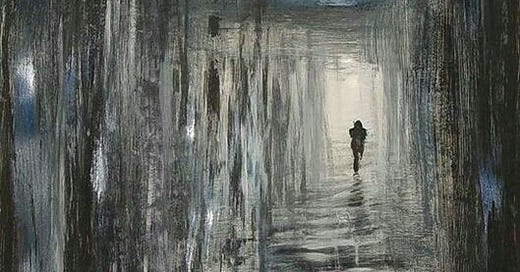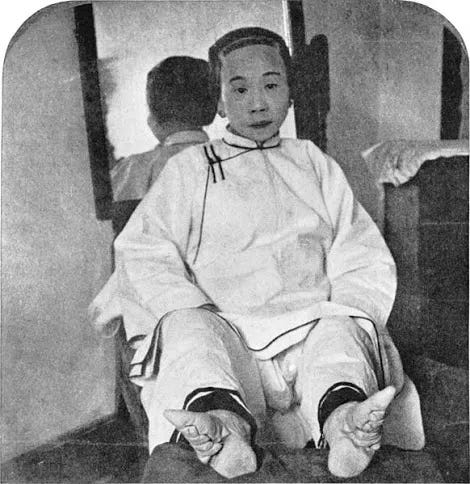Have you ever tried to focus at work after sleeping poorly the night before?
It's extremely difficult. Your attention drifts, your thinking is scattered. The reason is that you're in a biochemical battle with your own body. You're trying to will concentration while your chemicals are willing distraction. You’re trying to push forward while your biology is pulling you back.
Well the exact same thing happens when you do work you don't care about — your psyche resists. Your psyche wants to be gripped and fulfilled by what it does; if you subject it to monotony, it short-circuits.
Humans have a natural curiosity that, if denied, creates a psychic rot. You may have heard of the old Chinese practice of foot binding — breaking and reshaping young girls’ feet to make them more 'dainty’. Small, intricately bound feet were a mark of high status, proof that a woman was so privileged that she need not work or walk far.
The wage worker does the same thing to their mind. Instead of letting their thoughts stretch, wander and form their own natural shape, they're hamstrung to serve an artificial function. Just like those bound feet, your creative and mental muscles atrophy over time; your natural curiosity, once enchanted and animated, becomes smaller, weaker.
At some point, every person wakes up to this fact — usually after years of betraying their instinct for authenticity. The symptoms of their self-abandonment become impossible to ignore:
Life doesn't feel the same. Things feel hollow.
They drift through their days, living a checklist life.
They experience chronic exhaustion and dissatisfaction.
This is your soul sending you a distress signal that your talents and your life force are being cannibalized. And the more you ignore this cannibalization, the more you feel drained — not just at the end of the workday, but at the core of your being.
No amount of discipline, productivity hacks or caffeine can prevent this psychic rot from festering. Necessity might carry you for a year, perhaps even a decade if the money and status are intoxicating enough, but beneath it all, there will be a slow-moving erosion of your identity.
Human beings have two sets of needs — the animal and the existential. Once you have your animal needs of food and shelter met, that's essentially when human life begins. Mental health comes from having your existential needs met. Are you free to pursue your curiosity? Are you engaged in meaningful work? Are you connected and loved?
A society where the majority of people are perpetually trapped in meeting their animal needs is profoundly sick.
“Most important of all,” wrote Erich Fromm about certain pre-capitalist cultures, “was the principle that society and economy exist for man, and not man for them. No economic progress was supposed to be healthy if it hurt any group within the society.”
In order to live with this insanity, we invented the greatest lie of modern life: that enduring meaninglessness is, in itself, meaningful. That enduring monotonous work is something noble. This great lie is peddled among self-help gurus, life coaches and even well-meaning friends and family. “Be grateful you have a job,” they say. “Not everyone does.” “See this as an opportunity to grow,” they urge. Never mind that these same people would sell their grandmother to escape that arrangement themselves.
Henry David Thoreau delivered what might be the most brutal observation in human history. On his morning walks, he would pass by laborers engaged in some rote task, and upon returning in the late afternoon, would find them repeating the same task. His conclusion? That we should, without irony, applaud such a person for not ending their own life.
Wage work can have important benefits — you may gain technical skills and provide for a family — but never fool yourself into thinking that the benefits will outweigh the internal deterioration.
There is a cascade of profoundly corrosive consequences that happen the longer a person sacrifices large portions of their life to wage work:
You will slowly care less about meaning, curiosity, creativity and wisdom, as you routinely shelf your true self in order to excel as a careerist.
Your creative and intellectual muscles atrophy.
A creeping sense of apathy and dread sets in, often manifesting in anxiety and depression.
You will become more hedonistic. Free time becomes sedation time. Evenings and weekends become an exercise in escapism, a desperate attempt to recover the self that has been annihilated during working hours.
As I’ve argued elsewhere, at the core of our meaning crisis is the structure of modern work:
No one can build a truly great life without a significant degree of autonomy and leisure — something which is very difficult to do when you’re under the control of another person… When we’re alienated from our labor — when our best creative energies are spent on meaningless projects that serve someone else’s vision — we experience profound psychological estrangement. Most people feel that their true selves exist only outside of work, which means they're only themselves for a tiny portion of their lives. They live for the weekend or for the evening hours when they can finally pursue what they want, while the rest of their lives are put on hold. This fragmentation between “who I am” and “what I do” erodes any sense of a coherent identity. Modern work doesn’t just alienate, it imposes a kind of low-grade schizophrenia on all of us.
Meaningful work generates a natural momentum — focus comes effortlessly, creativity flourishes and our actions become animated. Meaningless work, on the other hand, generates a natural friction.
The real cost of wage work isn’t just your time, your exhaustion or even your creativity. It’s that, over time, you will forget who you really are.







It is truly cathartic in a way, when your feelings are echoed so profoundly by the words of another. Thank you for your wonderful work as always. It’s an aggressive act of rebellion to make time to be the person you were meant to be. Much harder these days when everyone around is so deeply sedated by the same ailment. Definitely need to come back to this from time to time
I was just thinking about it. I don't think entrepreneurship is the answer, because any business needs to survive and so it falls onto the same path of making money and having to grow. Am I wrong? Any entrepreneurs out there, are you not caught up in the same rat race of living for weekends minus the fact that you probably working through them? Is work a problem. Period?? Or is it the purpose of the work? I always think that working in a coffee shop should be one of the most enjoyable jobs on the planet because you make someone's day with your latte. If we could do this for 2-3 hours a day and move on to something else that we also enjoy, like designing and teaching a marketing course... "In letters from 500" they describe a future society where careers don't exist and people choose any job they want to do for a time being, and then move on to the next, they want to explore. But not for 8hrs a day. It's stupid. Work should be us helping a society and community to become better by contributing our unique talents and interests.